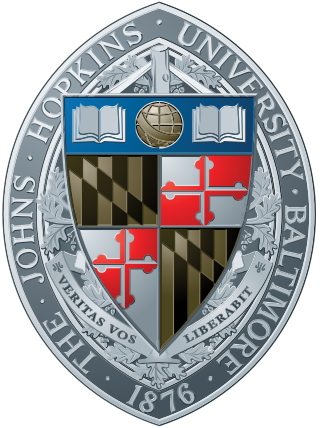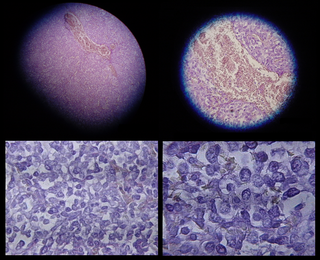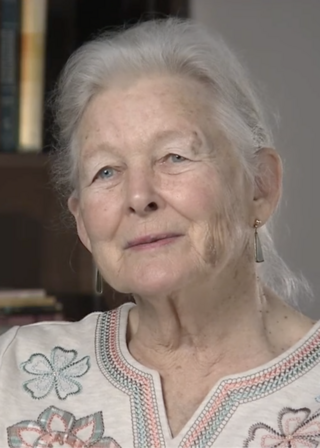The Scleroderma Research Foundation (SRF) is a non-profit organization based in San Francisco that funds research into scleroderma. The SRF also funds and supports Scleroderma Centers of Excellence, including the Johns Hopkins Hospital's Scleroderma Center in Baltimore.
Over 30 years, the SRF has raised millions of dollars for scleroderma research. The organization funds research based on review and recommendations by its Scientific Advisory Board.
The SRF website provides information on treatments, research, and their signature fundraising event.

Systemic scleroderma, or systemic sclerosis, is an autoimmune rheumatic disease characterised by excessive production and accumulation of collagen, called fibrosis, in the skin and internal organs and by injuries to small arteries. There are two major subgroups of systemic sclerosis based on the extent of skin involvement: limited and diffuse. The limited form affects areas below, but not above, the elbows and knees with or without involvement of the face. The diffuse form also affects the skin above the elbows and knees and can also spread to the torso. Visceral organs, including the kidneys, heart, lungs, and gastrointestinal tract can also be affected by the fibrotic process. Prognosis is determined by the form of the disease and the extent of visceral involvement. Patients with limited systemic sclerosis have a better prognosis than those with the diffuse form. Death is most often caused by lung, heart, and kidney involvement. The risk of cancer is increased slightly.

Johns Hopkins University is a private research university in Baltimore, Maryland. Founded in 1876, Johns Hopkins was the first American university based on the European research institution model. The university also has graduate campuses in Italy, China, and Washington, D.C.

The Johns Hopkins Hospital (JHH) is the teaching hospital and biomedical research facility of Johns Hopkins School of Medicine in Baltimore, Maryland. Founded in 1889, Johns Hopkins Hospital and its school of medicine are considered to be the founding institutions of modern American medicine and the birthplace of numerous famed medical traditions, including rounds, residents, and house staff. Several medical specialties were founded at the hospital, including neurosurgery by Harvey Cushing and Walter Dandy, cardiac surgery by Alfred Blalock and Vivien Thomas, and child psychiatry by Leo Kanner. Johns Hopkins Children's Center which serves infants, children, teens, and young adults aged 0–21, is attached to the hospital.

The Johns Hopkins Center for Talented Youth (CTY) is a gifted education program for school-age children founded in 1979 by psychologist Julian Stanley at Johns Hopkins University. It was established as a research study into how academically advanced children learn and became the first program to identify academically talented students through above-grade-level testing and provide them with challenging learning opportunities.

Robert Lane Saget was an American stand-up comedian, actor, director, and television host. He portrayed Danny Tanner on the sitcom Full House (1987–1995) and its sequel Fuller House (2016–2020). Saget was the original host of America's Funniest Home Videos (1989–1997), and the voice of narrator Ted Mosby on the sitcom How I Met Your Mother (2005–2014). He was also known for his adult-oriented stand-up comedy, and his 2014 album That's What I'm Talkin' About was nominated for the Grammy Award for Best Comedy Album.

Self-Realization Fellowship (SRF) is a worldwide religious organization founded in 1920 by Paramahansa Yogananda, the Indian guru who authored Autobiography of a Yogi. Before coming to the United States, Yogananda began his spiritual work in India in 1917 and named it Yogoda Satsanga Society of India (YSS). He came to the West in 1920 and in 1925 established SRF's headquarters at Mount Washington, Los Angeles, California. Before his return visit to India in 1935, he legally incorporated SRF in the United States, designating it as the only organization to carry on his work – to care for and disseminate his teachings.

The American Cancer Society (ACS) is a nationwide non-profit organization dedicated to eliminating cancer. Established in 1913, the society is organized into six geographical regions of both medical and lay volunteers operating in more than 250 Regional offices throughout the United States. Its global headquarters is located in the American Cancer Society Center in Atlanta, Georgia. The ACS publishes the journals Cancer, CA: A Cancer Journal for Clinicians and Cancer Cytopathology.
SRF may refer to:
The Smith Richardson Foundation is a private foundation based in Westport, Connecticut that supports policy research in the realms of foreign and domestic public policy.

CREST syndrome, also known as the limited cutaneous form of systemic sclerosis (lcSSc), is a multisystem connective tissue disorder. The acronym "CREST" refers to the five main features: calcinosis, Raynaud's phenomenon, esophageal dysmotility, sclerodactyly, and telangiectasia.

The Johns Hopkins Bloomberg School of Public Health is the public health graduate school of Johns Hopkins University, a private research university in Baltimore, Maryland. As the second independent, degree-granting institution for research in epidemiology and training in public health, and the largest public health training facility in the United States.
Sevin Rosen Funds (SRF) is a Texas-based venture capital firm credited with pioneering the personal computing revolution in the 1980s and also venture investing in Dallas. It was established in 1981 by L. J. Sevin, a former Texas Instruments engineer, and Ben Rosen, and was one of the leading investors on the US West Coast.
The Johns Hopkins University School of Nursing (JHUSON) is the nursing school of Johns Hopkins University in Baltimore, Maryland. Established in 1889, it is one of the nation's oldest schools for nursing education. It is continuously rated as the top nursing program in the US per U.S. News & World Report.
The Johns Hopkins School of Education is the school of education of Johns Hopkins University, a private research university in Baltimore, Maryland. Established as a separate school in 2007, its origins can be traced back to the 1909 Founding of Johns Hopkins’ College Courses for Teachers, later renamed College for Teachers.
The Johns Hopkins Center for Health Security is an independent, nonprofit organization of the Johns Hopkins Bloomberg School of Public Health. The center works to protect people's health from epidemics and pandemics and ensures that communities are resilient to major challenges. The center is also concerned with biological weapons and the biosecurity implications of emerging biotechnology.

The Mesothelioma Applied Research Foundation is a nonprofit organization funded by charitable donations that in turn funds mesothelioma research, provides support services to patients, educates the public, and advocates in Washington, DC for governmental funding for mesothelioma research. The organization's mission is to eradicate mesothelioma, a cancer caused by exposure to asbestos, as a life-ending disease.

Scleroderma is a group of autoimmune diseases that may result in changes to the skin, blood vessels, muscles, and internal organs. The disease can be either localized to the skin or involve other organs, as well. Symptoms may include areas of thickened skin, stiffness, feeling tired, and poor blood flow to the fingers or toes with cold exposure. One form of the condition, known as CREST syndrome, classically results in calcium deposits, Raynaud's syndrome, esophageal problems, thickening of the skin of the fingers and toes, and areas of small, dilated blood vessels.
The SENS Research Foundation is a non-profit organization that does research programs and public relations work for the application of regenerative medicine to aging. It was founded in 2009, located in Mountain View, California, USA. The organization publishes its reports annually.

Susan Pardee Baker is a professor emeritus of health policy and management at the Johns Hopkins Bloomberg School of Public Health and a injury prevention expert. She served as the first director of the Johns Hopkins Center for Injury Research and Policy. She is also known for developing Injury Severity Scores.

Johns Hopkins Children's Center (JHCC) is a nationally ranked, pediatric acute care children's teaching hospital located in Baltimore, Maryland, United States, adjacent to Johns Hopkins Hospital. The hospital has 196 pediatric beds and is affiliated with the Johns Hopkins School of Medicine. The hospital is the flagship pediatric member of Johns Hopkins Medicine and is one of two children's hospitals in the network. The hospital provides comprehensive pediatric specialties and subspecialties to infants, children, teens, and young adults aged 0–21 throughout Baltimore and the wider United States. Johns Hopkins Children's Center also sometimes treats adults who require pediatric care. Johns Hopkins Children's Center also features the only ACS verified Level 1 Pediatric Trauma Center in the state. The hospital is directly attached to Johns Hopkins Hospital and is situated near the Ronald McDonald House of Maryland.